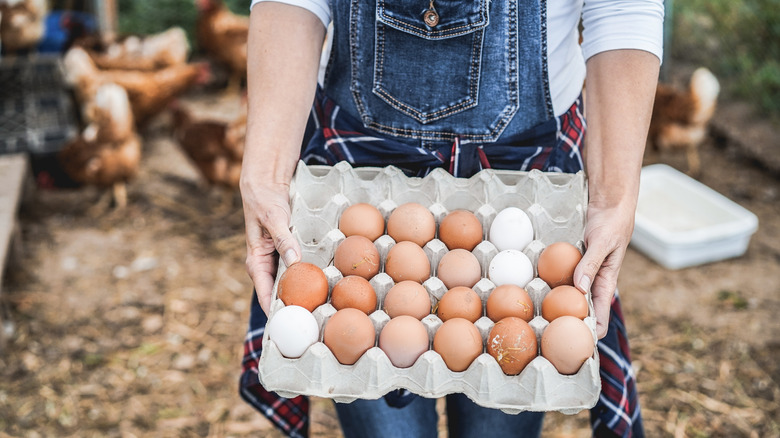Farm Fresh Egg Labels Actually Don't Mean Anything
The most creative marketing for foods is often found on labels. Yes, some marketing terms are regulated by the Food and Drug Administration (FDA), and thus are a source of useful nutritional information about products. But many other phrases and slogans are essentially meaningless, and are included only to help sell you on the food item. The term "natural," for example, might suggest foods made without artificial ingredients. But since there is no government standard to measure such claims, any producer so inclined can put this word on a food label.
It's not always easy to figure out whether the claims on labels are true, false, or somewhere in between. That's particularly true when it comes to something like eggs, which are both increasingly expensive and noted for their often misleading labels. Let's start with what you can't trust on egg labels, like the term "farm fresh." This is a 100% marketing slogan, Consumer Reports observes, since any place that produces eggs can label itself a farm, even if a densely-packed facility might be a more accurate descriptor. All this phrase really conveys is that the eggs haven't been frozen, but eggs typically aren't, so that aspect is basically meaningless, too.
How to decode egg labels
In addition to their meaningless "farm fresh" labels, eggs are also among the many food items likely to bear a "natural" claim, which likewise means nothing in terms of how the eggs were actually produced. Assertions about the treatment of hens who produce the eggs may also be misleading. The term "cage-free" is accurate in a literal sense, but doesn't indicate whether the hens benefited from good conditions, like room to roam or outdoor access.
The phrase "free-range," similarly, is no guarantee that hens aren't being kept in overcrowded conditions. This term is regulated by the U.S. Department of Agriculture (USDA), but the guidelines only stipulate that the birds have outdoor access. There is no way of knowing how often this access is granted, however, or even how much room there is for them to move around. "Pasture-raised" is another term that seems like it's associated with humane conditions, but is not clearly defined.
The only meaningful guarantees of humane conditions are the certifications given by certain animal welfare groups. For example, the Certified Animal Welfare label approved by A Greener World is third-party verified, as is the Certified Humane label.
Finding trustworthy information on egg labels
Despite some misleading marketing terms, there is information found on egg labels that is both helpful and trustworthy. Egg sizes and grading — the latter ranges from AA for the best-quality eggs to A and B for those meeting lesser standards — are quite useful, as is the term "organic." All of these labeling claims, in fact, are regulated and overseen by the USDA's National Organic Program. Thus, "organic" eggs are certified to have been sourced from well-fed (no GMOs, no pesticides), cage-free hens.
The "no hormones" label is technically true, but it applies to all hens, so although it might be reassuring, it's not very helpful. "All-natural," meanwhile, is just as useless as the more generic "natural" label. "Enriched with Omega-3" probably means the hens were given flax seeds, although it offers no guarantees of increased nutrition for those eating the eggs that were subsequently laid. "Vegetarian-fed" is yet another label that isn't as positive as you might think. Hens will actually eat anything they can find, so feeding them solely on foods like soy and corn — as is common with this label specification — can actually be bad for their health.
As a general rule, consumers should be wary of any marketing claims that aren't regulated by the FDA or USDA, and claims of humane treatment that aren't third-party verified by animal welfare groups.



